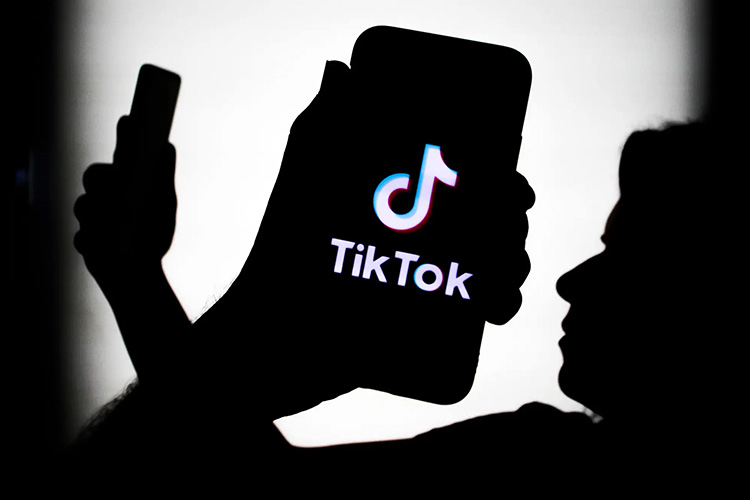
Sixteen percent of all teens say they use TikTok almost constantly. photo courtesy of Getty Images
Whether or not you use TikTok, we can all agree that it harms teenagers’ mental health.
How many hours of screen time do you average each day on your phone? After a swift inspection of our device’s settings, the majority of us would surely admit that we each waste far too much time on our phones. It is true that many smartphone apps such as Gmail and iMessage are practically a necessity these days; however, it is apps like TikTok that users are choosing to spend the majority of their screen time browsing. Mindlessly scrolling TikTok for hours each day is a far larger problem than most teenagers in the US would be willing to accept. Not only is it a form of procrastination, but it also contributes to a heightened state of anxiety.
Around two months ago, I conjured up all the strength in my thumb and used it to delete TikTok. Not only was I sick of wasting valuable time in my day, but I began to worry that the app was directly impacting my ability to focus. Watching poorly choreographed dance trends and brief clips slandering Andrew Tate no longer satisfied my craving for content. I began to realize, like many others, that absorbing such short videos in quick succession was actually harming my attention span – one that was already mediocre at best. Activities such as reading, watching television, or sitting down for a meal became somewhat difficult. In addition to my own struggles with the psychological addiction social media poses, teenagers all across our nation are facing similar experiences.
A tech article by CNBC revealed that as of 2021, “…63% of Americans between the ages of 12 and 17 used TikTok on a weekly basis, compared with 57% for Instagram…” This increase in TikTok usage is not random. In fact, experts claim that Tik Tok’s sophisticated and individualized algorithm is what leads users to scroll for longer amounts of time. However, it doesn’t take an expert to realize how TikTok carefully administers videos to users based on their video information, interactions, device and account settings, location, and interests. I would almost bet, for those of you who use TikTok, that your feed is consistently filled with videos that are oddly aligned to your actions and thoughts.
At first glance, TikTok’s algorithm may seem rather appealing. After all, shouldn’t we be able to browse content that is precisely suited to our interests and personalities? The answer should be a resounding yes, but not when that content begins to consume a teenager’s time and thoughts. Entertainment is a necessity for teenagers in these mundane times, but obsessive entertainment via TikTok only deters us from finding real value and substance in life.
To clarify, I don’t believe the content is always the issue, but rather the frequency that many tend to watch it with. As of March 1st, in an attempt to alleviate social pressure, TikTok announced that it would be implementing a 60 minute time limit for users seventeen and younger. Individuals who have accounts that are registered between the ages of thirteen and seventeen can simply bypass this limit with a pass code. Users who are thirteen and younger will require a parent or guardian to enter a pass code to access an additional 30 minutes of scrolling. While TikTok’s intentions may seem benevolent, this new time limit appears to be a mere diversion to force the app’s apparent mental health effects out of the spotlight. Besides serving as a warning, this new feature does virtually nothing to aid screen-addicted teenagers. Furthermore, many who have created a TikTok account in the past or present, including myself, can simply lie about their actual age. If I remember correctly, I selected 2000 as my birth year. Currently, any account registered with a birthdate of 2004 or prior will avoid TikTok’s new time limit completely.
The majority of the issues associated with TikTok are relative to usage rates. However, that does not dismiss the fact that the app administers harmful content to younger audiences. This sort of situation is when TikTok’s algorithm is blatantly negative. In December 2022, The Guardian released an article assessing TikTok’s self-harm study. The article read, “The Center for Countering Digital Hate (CCDH) found that the video-sharing site will promote content including dangerously restrictive diets, pro-self harm content and content romanticizing suicide to users who show a preference for the material, even if they are registered as under-18s.” This sort of sensitive material only exacerbates mental health concerns for teenagers across the country.
Due to Tik Tok’s addictive nature, users commonly scroll the app at random and regular intervals. It appears to be very common for teenagers to scroll the app before falling asleep at night. An article by the Psychiatric Times stated that, “TikTok users take approximately 1 hour and 7 minutes to fall asleep after using the app, and spend only 14% of their sleep in REM – almost half the recommended amount for a healthy adult.” In response to this information, Alan Blotcky, PhD, claims that “sleep is very important for processing one’s mental health. Sufficient sleep, especially REM sleep, facilitates the brain’s processing of emotional information – poor sleep is linked to mental health problems such as anxiety and depression.” From this information alone, TikTok clearly has the potential to worsen or create mental illnesses and disorders.
In writing this, I don’t mean to insult anyone who uses TikTok. After all, it can be extremely entertaining. Instead, I am writing this as a warning. Do not let life pass you by while your nose is buried in the screen of your ForYou page. And hey, maybe your parents were right. It really is all because of that damn phone.